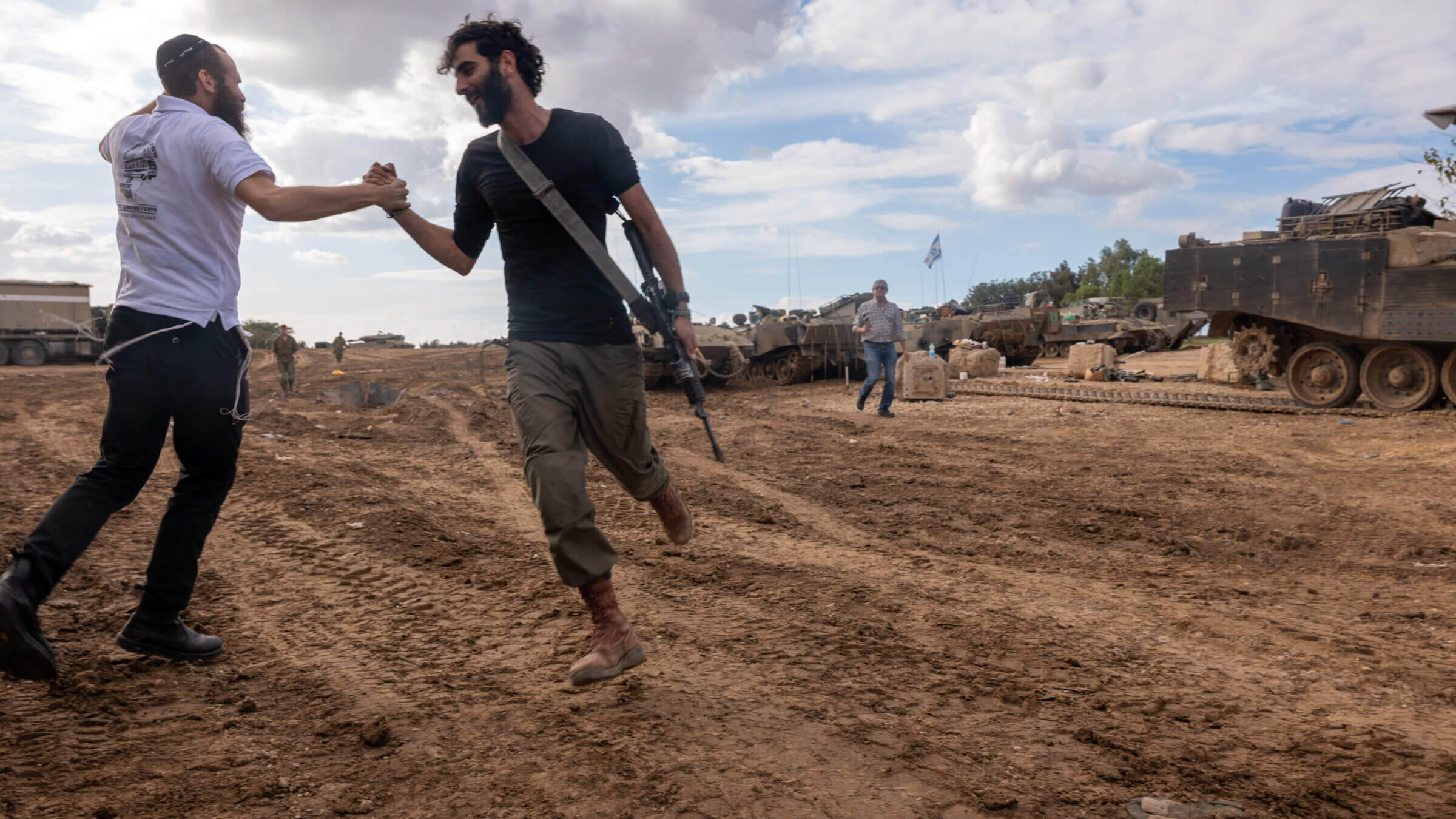Some Israeli Haredim are joining the IDF. Can secular Jews get along with them?
The current war can help secular Jews understand that the Haredim are not the threat they’re often made out to be

Members of the Israeli Defense Forces (IDF) dance with a member of the Haredi Orthodox community at a staging area near the border of Gaza on Nov. 28, 2023 outside of the city of Sderot, Israel Photo by Spencer Platt/Getty Images
“Shall your brothers go to war and you remain here?”
Those were the words that the prophet Moses used to chastise ancient Hebrews who preferred to avoid conflict and settle outside the Promised Land. And that is the question that more and more Haredi (sometimes called ultra-Orthodox) Jews in Israel are asking themselves.
When secular Israelis complain about their fraught relationship with Haredim, the refusal of the latter to serve in the army is usually the complaint that tops the list. But since the Oct. 7 Hamas terrorist attack, over 2,000 Haredi men have volunteered to serve in the IDF, according to Rear Adm. Danial Hagari. The first cohort has already finished basic training and is now in the field.
But their service resonates far from it, and helps bridge the chasm between them and secular society — which, I hope, will respond in turn.
There is a precedent, however short-lived, for today’s Haredi volunteers. As described by Yitzchak Kromby in Israel’s Future with an ultra-Orthodox Majority, in 1948, when forces from seven Arab armies invaded to destroy the nascent Jewish state, Haredi rabbis issued a horu’as sha’ah — literally “a ruling for the hour” — calling on all able-bodied Haredi men to pick up rifles and join the fight. But after the war, Rabbi Avraham Karelitz, the leader of the Haredi community, persuaded Prime Minister David Ben-Gurion to give draft exemptions to Haredi men “for whom learning Torah is their profession.” In 1952, when the exemption was enacted, it covered only 400 18 year-old men. Ben-Gurion justified the exemptions, pointing to other countries with similar laws, and reasoned that they would deprive the army of only a small number of men.
But the Haredim planned for a future in which they would represent a far greater proportion of Israelis — and indeed, today the draft exemption covers 63,000 Haredim aged 18-26.
When the Ponovitch yeshiva was founded in Israel in the 1940s, for example, it had only 70 students, but it was built for over 700. This was a bold decision. The Holocaust fell heaviest on the Haredi communities of Europe. One man later said that at the Ponovitch yeshiva groundbreaking ceremony, no one drank beverages, they drank only tears. But their optimism proved justified. Today the Ponovitch yeshiva has over 3,000 students.
This exponential growth has taken Haredim from 4% of Israel’s population in 1980 to over 13% today. Not surprisingly, this sharp rise has raised alarm that the Haredim might try to impose their values on Israel’s freewheeling secular culture. The fear is misplaced. In truth, the Haredim have long been models of tolerance.
Haredim are not shy about saying that gay relationships are inconsistent with their values. But in the history of Israel, no Haredi political party has ever proposed legislation curtailing Israel’s gay community.
Israel elected its first openly gay man to the Knesset way back in 1973. Perhaps the most remarkable thing is how unremarkable it was. The person elected is not even a footnote in Israeli history (his name is Akiva Nof, in case you were wondering). And the Haredi Jews joined a coalition that included him.
The Speaker of the Knesset today is an openly gay man named Amir Ohana. The Haredim sit with him in a coalition government as well. As Rabbi Elazar Shach, another leader of the Haredi community, once said, “we are not attempting to force anyone to do anything. We merely hope that God will give them the clarity to follow in his ways.”
Would that Israel’s secular community have treated the Haredim in the same manner. Starting in the 19th century, the founders of Zionism attempted to create a “New Jew” that was “liberated” from ancient traditions. In Theodore Herzl’s influential novel The Old New Land, the heavy of the story is an Orthodox Jewish rabbi who attempts to prevent European enlightenment from benefiting Arabs and Jews (who live happily ever after). The First Aliyah Museum in northern Israel has a film reenacting a scene that played out across Palestine in the early years of Zionist settlement. A group of Haredi children are learning in school when an official enters and informs them to close their books. The curriculum will no longer include religious studies.
In recent years, the army has grown more accommodating to the Haredi lifestyle, creating units that segregate men and women. Some feminists are understandably unhappy with the precedent. But the Haredi population has responded. One 2019 study, cited by Kromby, found that 17% of eligible Haredi men entered the army or some other form of national service.
The key to success is not going to be how many Haredi men come home with medals pinned to their chests, but how many come home with yarmulkes still on their heads. In the past, army officers made no secret of their hope and expectation that Haredi men who joined would abandon their traditional lifestyle. Today they recognize that the key to attracting other Haredim is the same thing that allows any pluralistic society to thrive. It is called tolerance.
The current crisis is going to change Israeli society in ways that we still do not know. But one silver lining in the horrific tragedy is that Israelis both secular and religious are coming together. Few believe that this will be the war to end all wars. But with a little goodwill on all sides, it can be the first war since 1948 in which the Haredim join their brothers in battle.
















